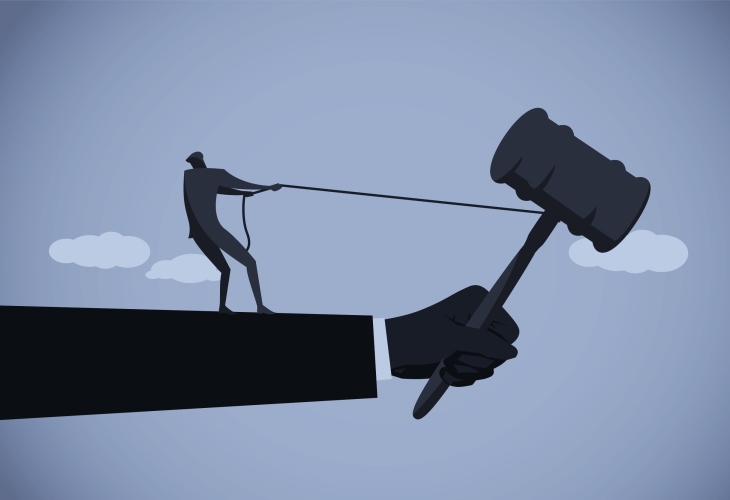Blowing the whistle on corrupt civil servants is not only a very serious undertaking, but also an extremely dangerous one. This is because civil servants have an array of weaponry and tactics to defeat even the most determined and courageous whistleblowers.
What follows is a set of observations and recommendations, developed through my experience in dealing with corrupt civil servants over the past decade.
There seems to exist a rebuttable presumption that complaints against civil servants are invariably unfair or unfounded. Rebutting this presumption is the whistleblower’s first hurdle. Unless the whistleblower is able to find a “champion” who will ensure that the complaint or disclosure will be taken seriously, the full range of weaponry described below is likely to be brought to bear against the whistleblower in the first instance.
My First Blast of the Whistle
Nearly a decade ago I published an article in which I blew the whistle on a corrupt civil servant, describing his conduct as being tantamount to blackmail. I stated in the article that I was a lawyer and that the corrupt civil servant was also a lawyer. The civil servant, let’s call him “Mr. U”, lodged a complaint with the Victorian Legal Services Commissioner (VLSC), the regulator for the legal profession in the State of Victoria, Australia, and I was asked to defend the complaint. (I later discovered that Mr. U had a close working relationship with the VLSC.)
I defended the complaint by lodging a full brief of evidence which clearly demonstrated Mr. U’s guilt, and I sought an investigation into Mr. U’s alleged criminal conduct. The regulator promptly dismissed Mr. U’s complaint, but then refused to investigate my complaint against him.
As I had proven Mr. U’s guilt on a prima facie basis and the VLSC’s refusal to investigate my complaint against Mr. U was clearly improper, I lodged a complaint with the Victorian Ombudsman, alleging various failures and shortcomings with the conduct of the VLSC.
Retribution
It was during the Victorian Ombudsman’s investigation into the conduct of the VLSC that I received a letter from the VLSC advising me that I was now the subject of a fresh investigation. (There had been no preliminary telephone call in accordance with the Commissioner’s stated procedure – I was taken completely by surprise, with no opportunity to give a preliminary response to the allegation made against me.)
The complaint was nonsense, as it was no more than a rehashed version of a similar complaint made by the same lawyer some years earlier, and which had been dismissed as baseless.
What ensued was a campaign designed to force me to accept guilt for trumped-up disciplinary charges using various forms of bullying, harassment, gaslighting, and biased investigations. When these failed, the VLSC resorted to ever more desperate measures, which eventually included perjury and perverting of the course of justice. There was the inevitable cover-up, a clumsy attempt to re-write history, an “incentive” of $80,000, and the quiet removal of officers who were exposed and who might attempt to protect themselves by blowing the whistle.
My Purpose
This introduction merely sets the scene. My purpose in writing this article is to expose the various methods and tactics available to, and used by, corrupt civil servants when they come under threat of exposure for misconduct, and to demonstrate that blowing the whistle on civil servants is not as safe or easy as governments would have us believe.

Strategies Used by Civil Servants
1. Wielding regulatory power
Civil servants are powerful and they know how to use these powers to good effect.
As regulator of legal practitioners in the State of Victoria, the VLSC controls the renewal of Practising Certificates. If a lawyer’s Practising Certificate is not renewed, the lawyer cannot practice and cannot earn a living.
It was time for me to renew my Practising Certificate – usually a quick and simple online process. When my Practising Certificate failed to arrive, I contacted the licensing manager in the office of the VLSC, who told me that my Practising Certificate was being withheld because I was under investigation. I stated my belief that the withholding of my certificate was linked to the ongoing investigation of my complaint against the VLSC by the Victorian Ombudsman, which of course was denied. The licensing manager later denied the conversation, but unfortunately for him, I had recorded it.
2. Ignoring evidence
When a civil servant asks for evidence or an explanation their true purpose may be to peep at your cards.
I argued that the complaint against me was nonsense, and I presented evidence and explanations to this effect. My defenses were ignored, but I was told that my attempted defenses indicated a “lack of insight” into my supposed wrongdoing.
Further protests and attempts to be heard were construed by the VLSC as compounding the complaint made against me, and resulted in a letter stating that VLSC had made a preliminary decision that I was “not a fit and proper person” to hold a Practising Certificate.
This changed everything, as now I was struggling to keep my law firm open and my staff employed. I requested a meeting in person with the VLSC.
3. Manipulation of regulations
Civil servants “own” the regulations under which they operate, and they define them in their favor. Challenge involves court proceedings, and civil servants have good lawyers and deep pockets.
The VLSC had no basis at all for a finding of “not fit and proper”. I had not been found guilty of anything, the false allegation made against me had not been investigated, and my defenses were sound.
None of this mattered, as the VLSC had the regulatory authority to exercise “discretion” in approving Practising Certificates.
4. False evidence
Lies are only problematic if there is a chance that they may be shown to be lies. There is a presumption that civil servants always tell the truth, as they are professionals with no reason to lie, as opposed to the complainant who invariably has an axe to grind. I met with the VLSC. The VLSC, the licensing manager, the head of the licensing office, and the Senior Investigator in charge of the complaint against me sat on one side of the table, and I sat with my lawyer on the other. I told the VLSC that the complaint against me was a nonsense, and that the same lawyer had made the same complaint 10 years earlier and the VLSC had summarily dismissed the complaint after finding in my favor.
The VLSC then turned to the Senior Investigator and asked him if the current complaint was merely a “re-agitation” of the previous complaint. The Senior Investigator lied, making up a fanciful story that I had made “abusive telephone calls” and sent “abusive emails” to the complainant. The Senior Investigator later committed perjury when he denied having told these lies. (Unfortunately for him, his lies had been captured in an audio recording.)
The false evidence of the Senior Investigator capped off the contrived meeting. I realized that nothing I could say or do would make any difference.

5. Gaslighting
Civil servants can easily declare that a person who blows the whistle is unbalanced, as though the act of blowing the whistle is, of itself, evidence of a disturbed mind.
I was told that I had a choice. I could plead guilty to a false charge of “Unsatisfactory Professional Conduct” which the VLSC could deal with in-house, or I could be formally charged with an equally false charge of “Professional Misconduct” which would involve court proceedings.
I was shown to a room and given a few minutes to make a decision. I returned to the meeting and informed the VLSC that I would defend all charges.
I was then told that I had an “anger management problem” and that a condition of my being permitted to continue practicing law was that I would have to see a clinical psychologist. So, now the VLSC was diagnosing mental illness, regarding an attempt to defend false charges as a manifestation of mental illness, and using my Practising Certificate as leverage to force acquiescence.
I signed a formal written undertaking by which I agreed to visit a psychologist. Although the psychologist wrote to the VLSC advising that she could discern no issues and that further visits were unnecessary, the VLSC demanded that I should see the psychologist three more times, at my own expense, during that year.
6. Concealing evidence
In most cases the civil servant “owns” all of the most important evidence. Any attempt to obtain evidence held by the civil servant will be resisted on the basis that it is “privileged” or “private” or may otherwise be exempt from Freedom of Information laws.
I have made a number of attempts to obtain documents that would assist me in proving corrupt conduct on the part of the VLSC, but these attempts have always come to nought. Indeed, the very existence of one of the most crucial items of evidence was not revealed until the Senior Investigator was actually in the witness-box giving his perjured evidence!
7. False investigations
Many civil servants have the power to initiate investigations. A false investigation can be used to “soften up” a perceived threat. If the investigation fails to reveal anything, the civil servant is usually protected by regulations that prevent disciplinary action against the civil servant.
The Senior Investigator mentioned above decided that he would initiate an investigation into communications I had sent to various parties, simply to see if I could be caught out on anything that he could declare as inappropriate. It did not matter that he was the subject of numerous complaints of bias, incompetence, and dishonesty. Indeed, these complaints were probably the motivation behind his fresh investigation.
Eventually, this false investigation was shut down, much to the disappointment of the Senior Investigator and his supervising officer, both of whom were then sidelined.
The Senior Investigator then quietly left the office of the VLSC and took up a position in another government department. (I believe that the VLSC made him an offer he could not refuse.)
8. Declaring a complaint vexatious
Similar to gaslighting, declaring a complainant “vexatious” is an attack on the credibility of the complainant. The results are multi-faceted insofar as the complainant is cornered and may have to defend the allegation. The declaration also acts as a form of “dog-whistling” to oversighting bodies and regulators.
In recent times, unable to prosecute me for disciplinary offences relating to my publishing of corruption allegations, or to initiate defamation proceedings (truth is an ultimate defense in both instances), the VLSC has published a baseless statement on the VLSC website declaring that my allegations of corruption are baseless and vexatious. Nothing more needs to be said, because this statement bounces the ball into my court. Only a formal investigation by an oversighting regulatory body can properly investigate the VLSC, and the dog-whistle has already been blasted.
9. Surreptitious closure of social media
Civil servants have authority, derived from the fact they represent the government and the community. If a civil servant asks a social media publisher to remove a posting from public view it is likely that this will be done without question.
Because of the immense power of the VLSC to thwart efforts to expose corruption, I created my own website onto which I have posted evidence of the corruption I have complained of. As the website contains true statements, supported by firm evidence, the VLSC cannot initiate any investigations or take legal action against me for fear of self-destruction.
I recently discovered that the VLSC had engaged a leading Australian law firm to write to the ISP through which my website operates, demanding that they remove my website under the threat of criminal prosecution. The letter pointed out that I had posted a recording of a VLSC staff member telling lies and that, while I was entitled under Australian law to publish the recording, the ISP was not, and this constituted a criminal offence.
Fortunately, the ISP forwarded a copy of the letter to me, but did not remove my website. I suspect that the ISP realised that the VLSC was not acting in the public interest and was simply attempting to cover up a culture of corruption.

10. Shutting down communications
Civil servants are able to ignore communications once they have declared the whistleblower vexatious.
Being declared vexatious is akin to being declared an “outlaw”. The right to be heard, the right to lodge a complaint, the right to have improper conduct investigated, and any other rights that would ordinarily give the individual some form of redress against a corrupt civil servant are effectively removed.
As a former police detective, I am aware of the need to put allegations to a party so that they have an opportunity to defend or explain their actions. I wrote to the VLSC, and to senior supervisors within the VLSC, and put to them the evidence I had gathered. I asked them to respond to the evidence of corruption and criminal conduct, so that I could publish the material, together with relevant explanations.
I was eventually told that I would receive no responses and that there would be no further communication of any kind.
In my next article, I have explained how I have managed to turn the tables on corrupt civil servants while remaining relatively safe in doing so.









